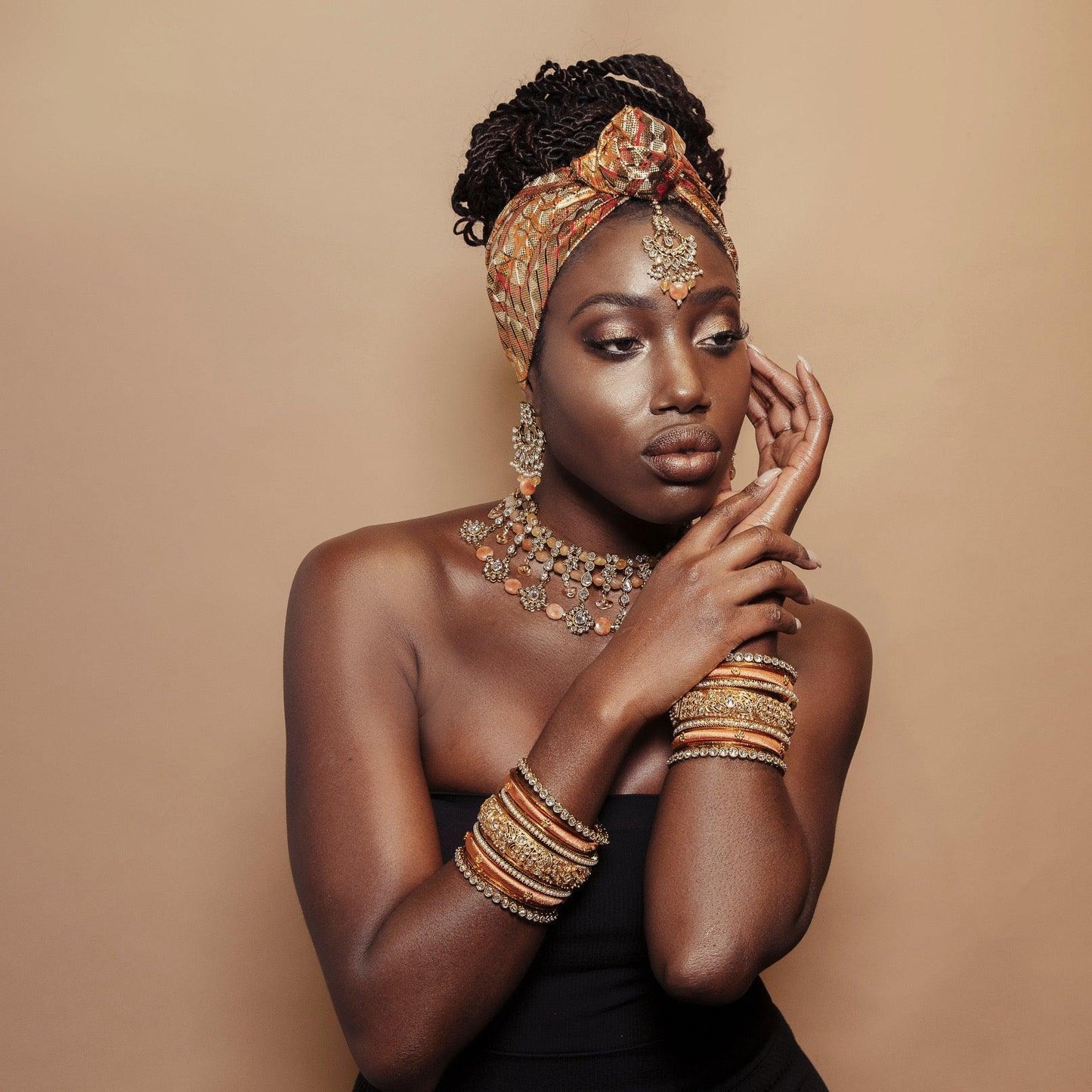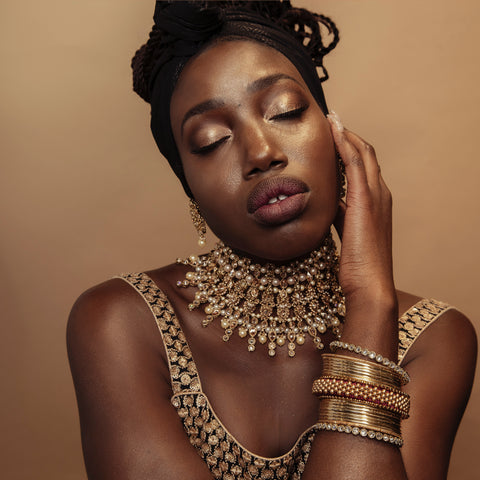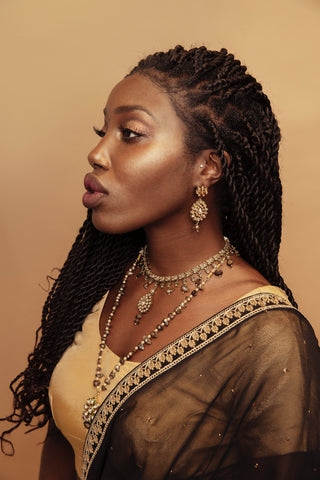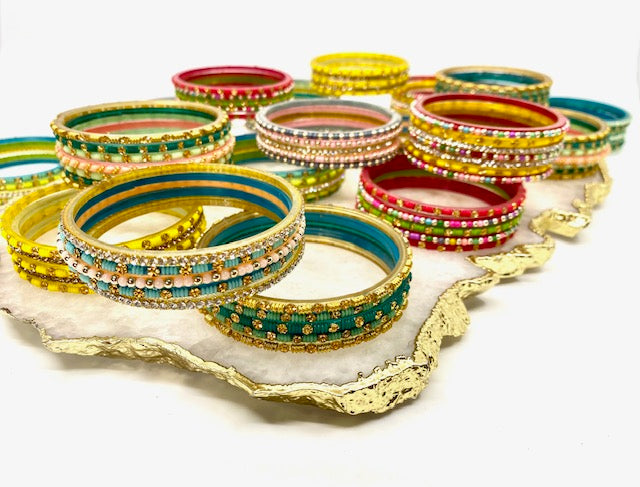
Facing Colourism + Healing through Diversity
by Amy Sylla
Poetry by Divya Balakrishnan
col·or·ism (n): prejudice or discrimination against individuals with a darker skin tone, typically among people of the same ethnic or racial group.
I was pleasantly surprised when Banglez reached out to me to model for the brand. Surprised on the one hand because Banglez is an incredible brand recognized worldwide so I felt honoured the founder wanted to collaborate with me. But mostly surprised as well because I am a dark skin black woman, Banglez's target audience is predominantly Indian, and I knew Africans and Indians have a lot of cultural similarities when it comes to defining beauty standards.
Indeed, the fairest skin has often been considered the best and most desirable one. The media has confirmed this bias by always glamorizing and idolizing the idea of being fair-skinned. In Bollywood movies, for example, light skin actresses play the stars while dark-skinned actresses play the roles of villains or sidekicks. Many ads as well, promote skin whitening products on every platform, inviting dark skin women to become a lighter, fairer, better version of themselves thanks to these products. So after all these facts, I knew choosing a dark skin model to promote a brand like Banglez was very rare. I must admit that the marketer within me felt some guilt at the beginning, thinking it would be a risk of losing customers for the brand. But then, the activist within me felt proud and realized how amazing it was to work with open-minded individuals who genuinely care about dismantling this bias and want to break the stigma.

It's time to heal through Colorism. Dark skin people must stop sweeping the topic under the rug, and lighter skin people must acknowledge its presence, be realistic when they perpetuate it and become allies to those with darker skin.
Last September 2020, I held a conversation that I called "Shadeism and the discrimination from within" through my platform Brown Sugar Talk. Every two weeks, I discuss race and cross-cultural topics with inspiring guests to uplift marginalized groups. In that specific episode, I invited three Black women from different cultures and shades to share their perspectives while offering some crucial guidance on how to not only heal but combat colorism. Some of the key takeaways written by a teammate were the following:
- Lighter skin often correlates to superiority, pureness, and privilege. Long-standing examples of shadeism include the “paper bag test” where skin colour was compared to the shade of a paper bag. While the practice would be frowned upon now, the idea that a person can be reduced to their shade is still very much present. As a result, we can be subject to discrimination and fetishization.
- Our ideals and values start at home. Conditioned or “made-up” beliefs are passed down to young minds which deeply affects the way we grow to see ourselves and others. This may appear in early discussions, especially regarding our partners. If you are darker, you may be familiar with the advice that you should be “more realistic about your partner”, encouraged to marry lighter, or even advised to dress in a way to draw attention away from your skin shade. Let’s question openly where that bias comes from.



Listening to these heavy stories was challenging but so necessary. The goal of this conversation was to educate listeners via sharing raw and real experiences and positive pieces of advice to evolve our way of thinking. The main lesson from the conversation was the following: Let your beauty shine and celebrate every part of you. Of course, this is easier said than done, but your self-confidence can be ignited by tuning in and taking the time to discover what you love about your soul. You are not defined by others’ beauty ideals. Together we are here to remind one another of that!
(You can watch the full conversation on Brown Sugar Talk YouTube Channel here).
I thought I would also share a few reflective questions from Brown Sugar Talk
- Have you taken actions to mold yourself into somebody else’s definition of beautiful?
- How do you empower your differences? Your shade? Your spirit?
- What media are you consuming? Have you noticed these subliminal roles portrayed based on the colour of the character’s skin?
(Request the full debrief, key takeaways and more reflective questions from this conversation at no charge here.)

I will end this blog by sharing this powerful poem written by Divya, one of the guests of the Brown Sugar Talk episode who is also a beautiful dark skin Indian woman:
"An Ode to Darkness
Blackness is the canvas of creation
Why vibration yields sound
How energy sets in motion
Where life breaks through ground
Night is when the moon
Makes her enchanting debut
Always departing too soon
Behind a veil of indigo-blue
Krishna, Gana-Shyama
Dark as the cosmos within
Kāli, Kālarātrisca
Divine through cremation
Dio Nero, Haashch’eezhini
Black God of Fire
Kartikeya, Son of Parvati
Born of the pyre
Blackness is prakṛti
Nature unfolded
Strong like Nefertiti
Ever sacred, never eroded
With the passing of time,
Why do we fear what isn’t light?
Is the sun so sublime,
That casted shadows don’t delight?
Blackness is eternal love
The all-encompassing one
Deep, yet rising above
Only stifled by a gun
But these tides will not lay low
In fact, they rise in the night
Shapeshifting, like the crow—
To make these wrongs, once again right
⁃Original poem by Divya Balakrishnan"
To all dark skin women: you are powerful, you are beautiful, and you are as bright as the stars in the night sky.
Love and light,
Amy
Instagram: @amy.missy // @brownsugartalkbyamy

Behind the Scenes of this powerful photoshoot.
A note from Malinda Chohan...
I’ve always been fascinated with the cultural similarities between people in Africa and India. We have been exploring, trading, and learning from one another for centuries. Our team came together on this project to celebrate our diversity while discovering how many things we have in common.
A diverse team came together to make this shoot happen. Diversity really does inspire a different kind of conversation. It was interesting to learn about each other’s cultures and upbringing.
It made me think we should share it...
I was born in Marseille and raised in Hyeres, a little town in the South of France. Both of my parents are from Senegal so I grew up being immersed in the Senegalese culture. I adored growing up in France but despite my love of the French culture, I reached a point where I felt that I didn't fit in my country anymore. I needed to leave for my self-development & love. I decided to move to North America in Dec 2013 where I lived for four years in Boston and most recently, I have been living in Toronto for the past three years. Moving abroad did not resolve every racial issue but being exposed to multiple cultures in different countries did allow me to love and accept myself fully as a Black woman and further understand my role.
The perspective of our Muse
Amy Sylla @amy.missy
I lived in Africa from the age of two to fifteen. Nigeria for 8 years and Kenya for 5 years. Being in nature, growing up with the safari experiences for the weekends, seeing and experiencing humanity in its purest form, made me realize how valuable these things are. The childhood I experienced growing up in Africa has made me more humble and appreciative of the smaller things in life.
The perspective of our photographer
Prachi Rathaur @rathaurportraits
(And she’s South Asian!)
My parents originated from Iraq and then moved to Abu Dhabi. Being born and raised in the UAE exposed me to different cultures and languages. I fell in love with the diversity at an early age and I was friends with people from all corners of the earth. The UAE is a melting pot of al religions and backgrounds and I feel so fortunate to have been exposed to that because it’s made me extremely adaptable, and it’s definitely brought out my creative side!!
From the perspective of our Makeup Artist
Lina Waled @linasmakeupandhair
I was born in Delhi and moved to Toronto when I was a year old. My mom is from Jammu Kashmir, and my dad is from Delhi. Like most children of immigrants I fell between two worlds that didn't always agree with each other.
My dad is a classical singer and tabla player, so there are few childhood memories that don't have kirtan, ghazals or qawalis to serve as a musical backdrop. The arts were not only encouraged in our home, they were an integral part of life. I took a 6 month solo trip to India when I finished my undergrad, and walked away with an entirely changed perspective around where I thought I came from. The culture, the music, the food, and most importantly the fashion!
When I got married we moved to Singapore for my husband's work for 2 years. We were lucky enough to be able to travel around Asia to what I truly believe are some of the most beautiful corners of the world encountering some of the most humble souls we've ever met. I'll always be grateful for these experiences that have had a forever impact on how I view the world and approach my work.
From the perspective of Preeti Kaur
@poppylane.ca
My family is originally from Guinea in West Africa but my grandfather moved to Ivory cost. I was born and raised in France, lived in London UK and then moved to Canada 10 years ago. I launched my African inspired clothing line in 2017. I love that in this project we were able to mix 2 different cultures through fashion.
The perspective of Fatim Sylla @siranis_fashion
I was born in Montreal and moved to Toronto when I was 4. Both my parents are from India; Goa and Bombay. On a family trip to India when I was 9 i fell in love and decided I had to return and find a way to make India a big part of my life.
Growing up around different cultures in Rexdale and my love for my own South Asian culture has deeply influenced who I am today and the work I share. I put together this shoot because I truly love learning about other cultures and have often wondered about the connections we have historically from country to country.
Muse + Blog @amy.missy
Photography @rathaurportraits
Makeup @linasmakeupandhair
African Headwraps @siranis_fashion
Lenghas @poppylane.ca
Jewellery + Creative Direction @banglez_jewelry










